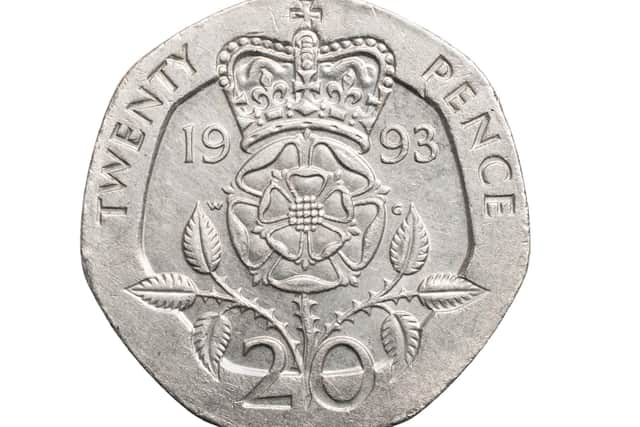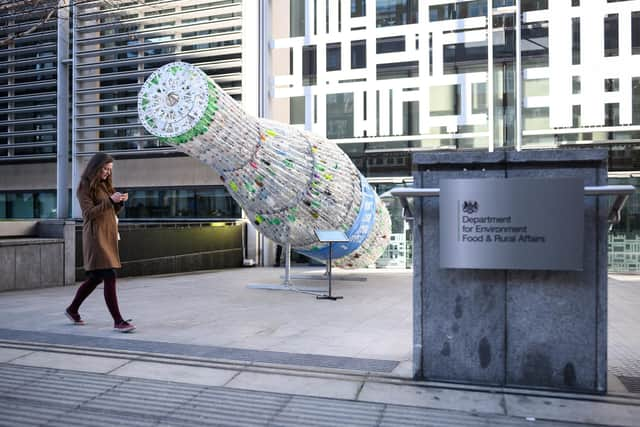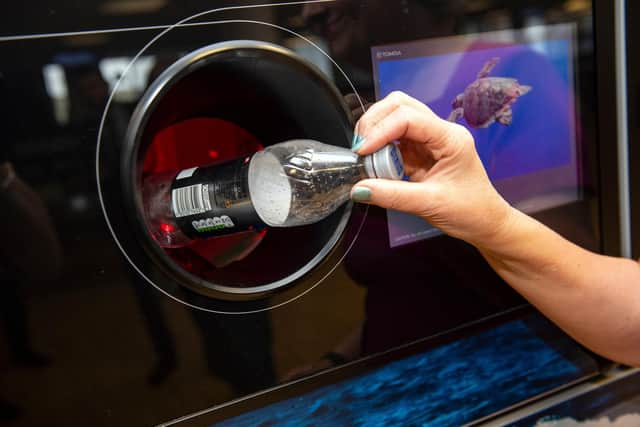How could the Deposit Return Scheme affect businesses and people in Scotland?
It is just over a year until Scotland’s Deposit Return Scheme (DRS) – which will see people charged a 20p deposit when they buy a drink in a single-use container – comes into effect and there have been many voicing concerns. The latest comes from a cross-party group of MSPs.
Members of the Cross-Party Group on Beer and Pubs has called on the Scottish Government to take time out to clarify and reappraise the scheme, insisting a fundamental review of the net benefits of the scheme is required.
Advertisement
Hide AdAdvertisement
Hide AdThis comes as Lorna Slater MSP – Minister for Green Skills, Circular Economy and Biodiversity – considers the findings from her second independent gateway review carried out last month to look at the feasibility of delivery. A similar exercise last year led to a delay in the DRS launch date.


Claire Rennie, from Summerhouse Drinks in Fraserburgh, believes the scheme may not be what people are expecting.
“It’s not the 20p scheme that everyone remembers (for example, taking Barr’s Irn-Bru bottles back to the shop for 20p),” she said.
"They were pretty much reusable bottles and very few people now buy soft drinks in reusable bottles. This is targeting single-use containers. The public will pay 20p extra for these, then have to take them back to a retailer who is operating a deposit return machine to get their 20p back.”
Industry sources explained to Scotland on Sunday the negative response from some businesses in Scotland’s drinks industry to the plans.


Many business owners feel their concerns have been ignored during the consultation period and the scheme will not make much, if any, difference to current recycling rates of cans and bottles.
One said: “If you look at recycling rates for cans, and glass bottles, they're not that bad. So, glass is up at 70 to 90 per cent and aluminium cans are at about 60 per cent. And these are old figures. These are before you've seen any improvement from the producer liability scheme. It’s essentially greenwashing and the fact it’s such a complex scheme is a disaster. It pushes a huge amount of complexity all the way through the chain so everybody has to chase these 20p deposits all the way through. It is right that we need to make some difficult choices to improve the environment, but let's make sensible choices.”
“We need to get to net zero, but will this scheme make a meaningful impact with all the complexities and changes that have come about since it was first suggested?” asked Jamie Delap, from Cairndow-based Fyne Ales. “A lot of decisions still need to be made which need time to feed though the supply chain. This is going to be a very high-profile environmental initiative and if it is an expensive failure it will do no favours when it comes to achieving net zero.”
Advertisement
Hide AdAdvertisement
Hide AdClaire Rennie spoke of her and other small business owners’ worries over the scheme: “There’s a few things in the legislation that makes us concerned. There’s different approaches throughout the whole of the UK. Scotland is introducing it first, for plastic, cans and glass bottles. But England isn’t introducing it for glass bottles, meaning there’s no seamlessness, which I think will cause confusion for people, especially in the Borders.


"For example, if someone buys a glass bottle of our lemonade in England and tries to return it here, they won’t be able to as it’s not applicable to the scheme here. There's going to have to be different labels on containers to identify which ones were bought in Scotland and are therefore eligible for the deposit return scheme here.”
Different labels
The need for different labels on containers to differentiate from Scottish cans, bottles and plastics and those going to be sold elsewhere in the UK (and are therefore not eligible for the scheme) is something that may not make a huge difference to big businesses, but could cause a huge headache for small producers.
Taking the burgeoning beer scene in Scotland as an example, if they want to (or indeed do) sell in a big supermarket, they will need to have different labels for the product with different barcodes - one to sell in English and Welsh supermarkets and one to sell in Scotland. This means the business has twice as many stock keeping units to keep track of which could breed inefficiency.


A source explained how this could impact small businesses.
“If you want to print a can, that's okay if you're Coca-Cola and you're printing millions of cans,” they said. “But if you're a small producer, the minimum run is 250,000. Smaller businesses won’t be able to justify printing 250,000 Scottish cans and 250,000 English cans. They’ll have to move to cans with labels, which are much more expensive.”
Space is also a concern for small businesses, who tend to sell through wholesalers, as Claire Rennie explained.
“Wholesalers, and businesses supplying England, will need to have double the space they currently have as they’ll have separate pallets of stock - one labelled for Scotland and one for England,” she said. “So, if you’re a wholesaler supplying both Scotland and England, you’re going to have to double your warehouse space. Then there’s the admin, and staff training, to make sure the correct stock goes to the right place. Our wholesaler is talking about charging that housing cost back to us which, why shouldn’t they, as if they don’t pass it onto us they’ll then pass it on to the retailer, shop or cafe, who then pass it on to the customer? Because of this, the price per bottle might not go up just by 20p, it might go up significantly more because of the costs that are involved.”
Do the numbers add up?
Circularity Scotland, the company which will act as the DRS administrator, estimates there will be 37,000 return points and 2.7 billion containers in scope. The original Business and Regulatory Impact Assessment (BRIA) was based on figures of 17,000 return points (and 2.2 billion containers). Essentially the scheme has doubled in size.


Advertisement
Hide AdAdvertisement
Hide AdAnother industry source, who wished to remain anonymous, said these seemingly out of date figures and spiralling costs were a worry for small business owners.
“Originally, the Scottish Government were basing their assessment on an assumption there would be 17,000 retail return points to be collected from,” they said. “That has now grown to 37,000 return points. So, the scheme has doubled in size. But essentially, they are still basing their assessment of the impact of the benefits on those old figures. This also means that costs of the scheme, and the costs to businesses, have gone up. There are strong concerns that Parliament is not being presented with an accurate assessment of costs and benefits for DRS.”
Impact on kerbside recycling
he majority of recycling is dealt with by kerbside collection by Scotland’s councils. The cost of this lies with the local authority, and it can recoup some costs by selling the raw materials. But if these are no longer being made available to the council, will they still be able to afford the kerbside recycling?
A source told Scotland on Sunday there is no clear answer as no council has engaged with the consultation scheme.
“While councils are under a legal obligation to recycle via these collections, they only have so much money available to them,” they said. “If you suck all of the valuable elements out of recycling, it's going to stop or it's going to have an impact. It's a great unknown.”
This view was reflected in the cross-party report, in which Mo Baines, deputy chief executive of the Association for Public Service Excellence (APSE), said the environmental costs and benefits had not been properly assessed for refuse collection. The analysis of material going into household waste had been conducted pre-lockdown, meaning consumer behaviour, and the effects on waste streams of hybrid working, had not been reviewed.
Under the DRS, high value glass items such as wine bottles will either no longer be going into kerbside recycling or there will be fewer bottles, but the obligation to collect other items of glass will still be there. Ms Baines explained this could cause problems for local authorities locked into longer-term waste disposal contracts. British Glass, in written evidence, said Dumfries and Galloway Council had announced the end to its kerbside collections for glass.
“We will only be collecting a small percentage of the glass items we currently collect, making kerbside collections for glass unsustainable and not cost effective,” it said.
Impact on the poorest
Advertisement
Hide AdAdvertisement
Hide AdAs the cost of living increases rapidly, there are concerns the DRS could affect the poorest in society - those who will find it hardest to get to a recycling point in order to get their deposit back.
One source said: “It’ll be ok for the middle class and two-parent families, one of whom works and the other one can be dropped off at a recycling point, but it's just not that easy for everybody.”
Impact on small businesses vs big corps
Particular concerns were highlighted in the report about smaller businesses, such as Scotland’s independent brewers, bottle shops and online retailers with the costs being disproportionately felt by smaller businesses. It recommends a de-minimis threshold could protect these businesses while the scheme beds in.
“The British Soft Drinks Association class Fentimans as a small business, and they are a 38 million pound turnover,” said Claire Rennie. “That makes us in the micro class.
"Can you imagine the admin that’s required for a small business like us to work out where our bottles are going? In order to be involved with the scheme, you can manage it yourself and give information back to SEPA, which is a really huge amount of admin. Or you can get involved with Circularity Scotland, which is an industry body that's basically running the scheme. They’re talking about having an admin charge per bottle. Say it’s 1p per bottle for their admin, to run the scheme on our behalf, but there’s no differentiation between a bottle of whisky at say £40 or a bottle of lemonade at £2.50. Small producers are getting hammered for having a cheaper product in our bottle.”
E-commerce and environmental effects
One of the main ways small drinks companies found a way to survive the pandemic was to sell directly to their customers via online shops, with home delivery. DRS could also have an impact on this, as if a company sells directly to the consumer, they have to take the cans back again, as part of the scheme.
Therefore, small businesses, such as breweries or craft distilleries, will need to create space to deal with food waste processing, get SEPA accreditation to deal with food waste, have some kind of disposal mechanism as liquid from cans and bottles cannot be poured down a drain into the water supply, will require PPE for dealing with cans and bottles, and staff will need to be trained.
A source said: “None of them (small businesses) have even mentioned this as the DRS is not on their radar because they are small businesses and they are not going to be ready. This risks taking away ecommerce as a channel for them, and it's incredibly strategically important.”
Advertisement
Hide AdAdvertisement
Hide AdAnother ecommerce impact consumers may see under the DRS is when ordering online.
Claire Rennie explained: “If you ordered a case of tonic from us, I would have to pay for the courier to come to your house, you’d have to wait in for the courier, and the bottles would come back to us. That’s going to basically take away our margin for supplying those drinks.”
Another source explained the effects on the environment of this: "There are going to be more vehicles on the roads having to collect from all these return points, which in itself is going to have a big impact on emissions and transition to net zero, and so on."
Claire also voiced these concerns: “You're going to have all these vans going across the country picking up empty bottles to bring them back to Aberdeenshire where we can't recycle them, so more vans will need to collect them from us to go into the system for recycling.”
While SEPA say this aspect of the scheme is really only designed for people who are housebound, disabled or who cannot get out, Claire said: “It's a legal requirement so anyone can ask for us to take the bottles back. I can't plan whether or not you are or aren't going to ask for that, so I won’t know whether I’m going to make any money on that sale. From my point of view, I just think, ‘well, I'm not going to supply in Scotland, I'll just sell to England’, because how can I plan as a business owner?”
There are also the island companies to think of, as Claire explained: “Imagine if you've ordered a bottle of Lussa Gin. Then imagine that the order needed to be collected and sent back to Jura only to come back to the mainland to be processed.”
In written evidence within the cross-party report, Glasgow’s Wee Beer Shop wrote: “Retailers need to purchase and install expensive equipment to process returns - something my business has no physical space to host - I literally have a wee shop. I also have concerns about the ability of small shops to manually process and store returns. I staff my shop myself and will struggle to process returns and run the shop at the same time. I also have an online shop and having to offer the takeback service will be undeliverable. It will be far too costly for us to arrange the pick-up of empty containers."
Another potential problem is that the cans, bottles and plastic containers are classed as food waste, yet couriers cannot pick up food waste as it cannot be put in a vehicle that could contain food products.
Advertisement
Hide AdAdvertisement
Hide AdAs a source said: “Do you expect DPD to come with an empty van, do a pick up, take it back and clean down the van before they can put it back on the road? It's nonsense.”
Small convenience shops
In a small, local shop, containers will be able to be returned via a reverse vending machine but the specifications for these, the lead time to order them and costs have not been made clear to shop owners.
A source said: "if you can't afford a reverse vending machine, or if you can't, and don't have the space to accommodate one, then you're likely to have to take back the containers manually over the counter, which is potentially massively disruptive. And in a typical convenience store, every area of selling space has been maximised and storage space has been reduced. So there's almost nowhere to store these containers."
Whole of UK scheme
As well as an urgent review, the report recommends the Scottish and UK governments work together to align their schemes so there is a single market for brewers and retailers. Without doing so, there will be three different markets with possible knock-on impacts of complexities, costs and wastage. It also argues for a phased introduction of products, starting with plastic, to build consumer understanding and allow infrastructure to develop.
Claire agrees a four nations approach would be simpler, saying: “It's such a complicated scheme, if there was a bit more communication and co-working between the four nations, it would be so simple and probably more effective. Glass also needs to be either part of the scheme in all four nations, or not, as it just makes things too complicated.”
If this four nations approach does not happen, there is concern from some small business owners that Scottish consumers could lose choice from the market, as Claire explained: “Consumers will have less choice because companies outside Scotland will look at (the scheme) and think, ‘It's only five million people, why am I going put all that hassle for that size of a population?’ Therefore they will just not bother. We’re going to lose innovation and niche, local producers.”
Jill Farrell, director of evidence and insights at Zero Waste Scotland, said: "The upcoming Deposit Return Scheme in Scotland will improve recycling quantity and quality, as well as reduce litter. Our research predicts that 34,000 fewer plastic bottles, cans and glasses will be littered every day with the introduction of a Deposit Return Scheme in Scotland. The scheme will also contribute to Scotland’s low-carbon economy and generate new jobs, while creating opportunities to raise funds for good causes.
“As the appointed administrator, Circularity Scotland is working with its members and the scheme regulator, SEPA, to successfully implement the scheme.”
Advertisement
Hide AdAdvertisement
Hide AdA spokesperson for Circularity Scotland said: “Scotland’s Deposit Return Scheme is one of the most significant environmental infrastructure projects ever introduced in the UK and the most comprehensive deposit return scheme anywhere in the world. Circularity Scotland has been established by producers, retailers and hospitality operators to act as a scheme administrator for the scheme and our members include trade associations who provide input from the perspective of smaller companies. We are working at pace to ensure that the scheme runs effectively and efficiently, and at as low a cost as possible, from August 2023.
“Following a robust and in-depth due diligence process we have recently secured investment of £9m from the Scottish National Investment Bank and a further £9m from Bank of Scotland, both of which will be repaid over time, to support this crucial set-up phase of the scheme. With this backing, we look forward to continuing to engage producers and retailers of all sizes, as well as other partners across Scotland as we build towards the launch of the scheme.”
Comments
Want to join the conversation? Please or to comment on this article.